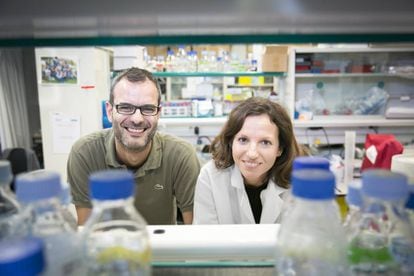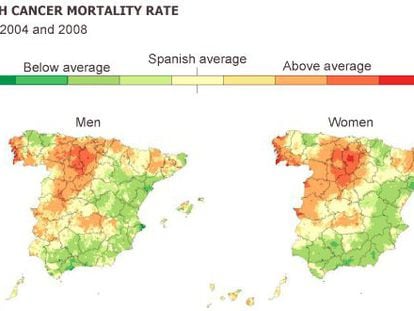Spanish team discovers protein that sparks metastasis
Barcelona’s IRB team makes breakthrough that appears to link fatty diet to some cancers
Metastasis means death to 90% of cancer patients. But thanks to the work of a team at Barcelona’s Institute for Research in Biomedicine (IRB) we now have a better understanding of the process of metastasis by which a few cells break away from a tumor, creating new growths in other parts of the body.

An article published in the journal Nature details how a team led by Salvador Aznar Benitah has identified a protein that plays a crucial role in metastasis and could improve diagnosis, revolutionize cancer treatment and even change our diet.
Feeding the mice a high-fat diet led to more and larger tumors
Aznar’s team are specialists in the type of stem cells found in tumors, the job of which is to boost their growth. By studying the behavior of these cells in human oral carcinoma, they found a sub-population that hardly divided and that presented similar characteristics to metastasis cells. Furthermore, the team was interested to note that the metabolisms of these cells were high in fat.
Using mice, the team decided to study the protein CD36, a molecule that transports fat and is found on the surface of these cells. “It is the door through which fatty acids from the outside come in, through diet or some other means,” says Aznar. CD36 has been found in metastasizing cells in other types of tumor, such as melanoma or breast cancer, and after carrying out statistical analysis on patient samples, they established the presence of CD36 in ovary, stomach, and lung cancers; and most importantly, when they added CD36 to tumor cells that had not metastasized, they began to do so.
Their findings could improve cancer diagnosis. “We have added a marker for CD36 that allows us to purify metastatic populations at unprecedented levels,” says Aznar. “We don’t imagine that this is the only one, but it does seem to be universal. The higher the CD36 level, the greater the probability of a tumor metastasizing. We haven’t proved it in every tumor, but we have in many of the most common and in those there is a direct association between CD36 and a worse prognosis for patients,” he concludes.
Benitah’s team is now working to develop antibodies against CD36 that could be used in clinical trials, although he estimates it would take at least another four years to reach that milestone. Benitah notes that such a therapy may be effective even after cancer has started to spread: in mice, experimental antibodies eradicated metastatic tumors 15% of the time. The remaining metastatic tumors shrunk by at least 80%.
Using mice, the team decided to study CD36, a molecule that transports fat
The team is also looking at the implications of another finding: feeding the mice a high-fat diet led to more and larger tumors in the lymph nodes and lungs — a sign of metastasis — compared with mice on normal diets. Benitah’s team is now carrying out a study that aims to enroll 1,000 people with cancer, profiling lipids in their blood to look for any links to the spread of cancer cells.
But at this stage, it is too early to tell people to avoid fatty foods, says Benitah, especially people with cancer.
English version by Nick Lyne.












































